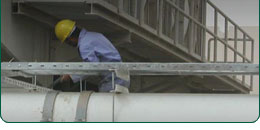
Home
Company
Principals
Experience
How We Work
Expertise
Partnerships
Technology
Contact
Technology
Security Coating Systems (SCS) Polyurea Blast Protection Technology
The PolyEarth is the Middle East representative and globally authorized agent for the application of Security Coating Systems (SCS) Polyurea Blast Protection Technology. SCS is a division of Sherwin-Williams.
The PolyEarth, along with our Middle East partners, offers a complete turn-key design/build scenario including capability to design the SCS application, supply the product, handle the logistics, provide oversight and management, install the product, and monitor Quality Control.
SCS blast protection consists of a spray-on polyurea technology and explosion resistant panel for both buildings and vehicles, including government and civilian armoured vehicles.
The most commercially recognizable polyurea product applications are truck bed liners, industrial flooring, storage tanks, and protective coating of equipment. SCS products can be sprayed on the interior of metal surfaces on armored vehicles to help stop spall or shrapnel from passing through the body of the vehicle and into the passenger compartment after an explosive event. A version of this product is currently being used by the U.S. Military in Iraq as supplemental armor on some armored vehicles.
SCS is lighter and weighs 1/3 less than High Hard Steel (HHS). Therefore, vehicles are more maneuverable and incur less maintenance issues.
This polyurea “amour coating” product also works exceptionally well to consolidate building materials during an explosive event. With proper spray application, this product bonds tenaciously to masonry and brick and acts like a large elastic membrane which stretches to absorb the shock wave of an explosion. This protection may save lives by virtually eliminating brick debris from flying into the room. Significant testing has been done on this particular application of the product.
Soil Stabilization
Blending Soil Fibers and Synthetic Fluid Stabilizers is new technology for global construction. Through both field trials and independent laboratory testing, this blended technology has shown extremely good results as a cost competitive alternative to importing expensive classified materials for the civil construction of runways, roads, and pads in rural areas. PolyEarth recognizes the success of this specific product in the North American construction industry and how it would benefit other countries in terms of application and cost savings.
Different types of soil fibers have been used for soil stabilization throughout the world for approximately 15 years. This technology utilizes fibers made from high-strength polypropylene (the same as most civil geotextiles) and do not contain elements harmful to the environment. Properly applied, soil fibers will dramatically increase the compressive strength (CBR) and the Shear Strength of silt laden sands (such as poorly graded material), making the material suitable for conventional track and wheeled traffic. Soil fiber integration also strengthens and reinforces sub-base material prior to asphalt paving or constructing a concrete pad.
Synthetic fluid stabilizer is a paraffin based hydro-active liquid material that can be applied in temperatures down to minus 40 Celcius (-40 C). In liquid form, the material binds and coats all contacted soil, therefore displacing water as a compacting agent. This soil stabilization material is water repellent, yet maximum moisture content ensures compaction. The surface is self-healing in case damage occurs. Due to the binding nature of the material, dust control is an added benefit.
Polyurea CoatingPolyurea is a state-of-the-art, high performance, plural component elastomer. This system is based on amine-terminated polyether resins, amine chain extenders and MDI prepolymers. It provides a flexible, resilient, tough, monolithic membrane with good water and chemical resistance. |
||
|
||
 |
||
|
||
© 2013 PolyEarth USA, LLC
2801 W. 100th Ave., Anchorage, Alaska USA 99515